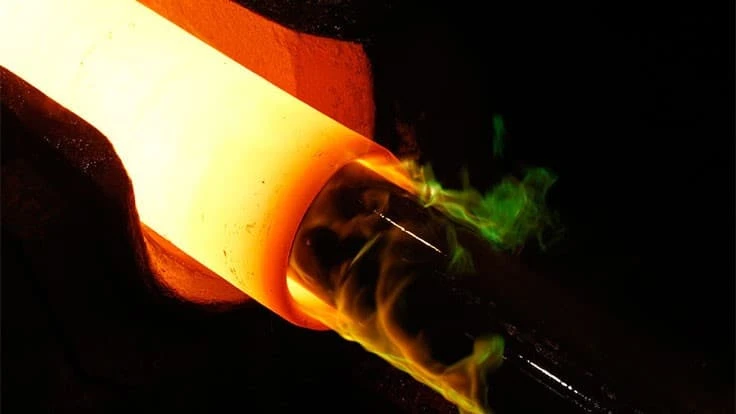
U.S. Steel
United States Steel Corp. (U.S. Steel), headquartered in Pittsburgh, has decided to idle operations at its tubular plants in Lorian, Ohio, and Lone Star, Texas.
A statement from the company to Recycling Today reads: "This week, U.S. Steel advised employees that Lone Star Tubular Operations in Lone Star, Texas, and Lorain Tubular Operations in Lorain, Ohio, will indefinitely idle operations due to challenging market conditions and high import levels. The company has issued Worker Adjustment and Retraining Notification (WARN) notices related to the indefinite idling at each facility. The WARN notices advise that layoffs related to the adjusted operations could take effect in as little as 60 days.
"The adjustment of operations has the potential to impact approximately 600 employees at Lone Star Tubular Operations. At Lorain Tubular Operations, the potential impact is around 250 employees. While we do not expect to lay off that number of employees, the total number of employees impacted will depend on operational and maintenance needs."
The company issued a WARN Act notice to the state of Ohio March 23, alerting that it would indefinitely idle the U.S. Steel Seamless Tubular Operations LLC in Lorain, with employment losses expected to begin May 24.
The Lorain mill manufactures 380,000 tons of seamless pipe used in oil and gas exploration and construction, the U.S. Steel website notes.
Lone Star Tubular’s mill No. 1 produces electric-resistance welded (ERW) pipe ranging from 7 inches to 16 inches in outside diameter (OD) with an annual production capacity of 400,000 net tons, while its mill No. 2 produces pipe ranging from 1.088 inches to 7.15 inches in OD with a capacity of 390,000 net tons per year, the company’s website says.
In first-quarter 2020 earnings guidance the company issued March 20, U.S. Steel President and Chief Executive Officer David B. Burritt says, “The tubular market continues to be challenging, and conditions in Europe remain volatile. We are focused on preserving cash and liquidity in the current market environment.”
The outlook appears to be better for the company’s flat-roll operations. “Through the quarter, our flat-rolled operations have performed well, and we are recognizing the operational and financial benefits of the investments in our assets that we have made over the past several years,” Burritt says. “Strong performance on reliability, quality and productivity, combined with a continued focus on driving sustainable cost improvements across the footprint, have contributed to a better than expected first quarter to date.”
He adds, “We continue to monitor the impacts of the coronavirus and are following policies and procedures recommended by health and government officials to ensure our employees are working in a safe and healthy environment. We understand the situation remains fluid, and we are preparing our operations to be flexible as circumstances may warrant. Our regional supply chain minimizes the risk of significant supply-chain related production disruptions, and we continue to work with our customers to provide value-added steel solutions as we execute our world-competitive, ‘best of both’ strategy.”
U.S. Steel indicates that its adjusted earnings before interest, taxes, depreciated and amortization (EBITDA) for the first quarter of 2020 are expected to be approximately $30 million, with first-quarter 2020 adjusted diluted loss per share to be approximately 80 cents.
The company says its flat-rolled segment results are expected to be better than anticipated, pointing to strong operating performance, continued cost improvement and seasonally strong shipment volumes that more than offset the typical seasonality of mining. Additionally, the domestic flat-rolled steel market has remained healthy throughout the first quarter to date. U.S. Steel says extended lead times are supported by “robust construction end-market demand and an end to destocking that negatively impacted order rates throughout 2019.”
In April, U.S. Steel says it will begin the indefinite idling of its iron and steelmaking operations at Great Lakes Works outside of Detroit. This decision was previously announced in December 2019 as part of its “best of both” strategy. U.S. Steel says it expects to indefinitely idle the Great Lakes Works hot strip mill before the end of 2020. Separately, the company adds that it expects to begin a scheduled 48-day outage at its Gary (Indiana) Works blast furnace No. 4 in April.
The company's "best of both" strategy refers to its partnership with Big River Steel in Arkansas that gives U.S. Steel "the best of both integrated and mini mill technology and talent."
In Europe, the company says steel selling prices have steadily increased throughout the quarter, resulting in better than anticipated first-quarter performance for its European segment to date. Still, the flow-through of lower prices on its monthly and quarterly contracts and elevated raw material costs are limiting near-term financial performance, U.S. Steel adds.
Regarding the global coronavirus outbreak, U.S. Steel says it “is an unprecedented and rapidly evolving situation. It remains uncertain how long the situation will last and what the impacts will be for the full year. Given the significant uncertainty in the marketplace, we continue to monitor demand levels and plan to provide more information during our first-quarter earnings call.”
Latest from Recycling Today
- BMW Group, Encory launch 'direct recycling’ of batteries
- Loom Carbon, RTI International partner to scale textile recycling technology
- Goodwill Industries of West Michigan, American Glass Mosaics partner to divert glass from landfill
- CARI forms federal advocacy partnership
- Monthly packaging papers shipments down in November
- STEEL Act aims to enhance trade enforcement to prevent dumping of steel in the US
- San Francisco schools introduce compostable lunch trays
- Aduro graduates from Shell GameChanger program





